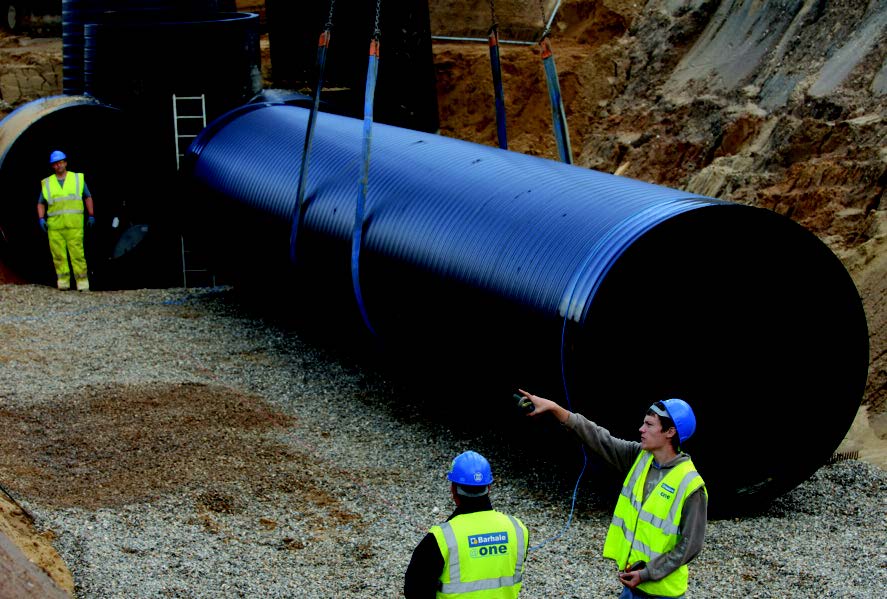Large Diameter HDPE

Large diameter HDPE pipes are tough, lightweight, shock and chemical resistant. They offer installation economy and long service life. These pipes are available in standard lengths of 3, 6, 12 and 14m. Special pipe lengths can be produced to meet almost any need.
Features & Benefits
- Lightweight and impact resistant
- Corrosion and chemical resistant
- Flexible and fatigue resistant
- Installation is cost effective saving time and money against alternatives
- Ability to manufacture from 2kN/m2 to 8kN/m2 (standard strengths are 2kN/m2 & 4kN/m2)
- Various lengths up to 18m
- Sizes from 700mm to 3000mm
Applications
- Gravity and low pressure applications up to 1.5bar internal pressure
- Surface water drainage & attenuation
- Culverts
- Fouls sewers
- Sea or river outfalls
- Pipe rehabilitation and relining
- Landfill
- Manholes
- Marine pipelines
- Below and over ground applications
Fabrications
JDP supply fabrications from bends and junctions to complete off site solutions designed to customer specification. Please ask your local branch for more details. See also our Preformed Chambers section.
Large Diameter HDPE Product Range
| Stiffness Class | 2 kN/m² | 4 kN/m² | ||
|---|---|---|---|---|
| ID (mm) | OD (mm) | Total kg/m | OD (mm) | Total kg/m |
| 700 | 758 | 25 | 782 | 32 |
| 750 | 812 | 25 | 840 | 36 |
| 900 | 962 | 36 | 1012 | 48 |
| 1050 | 1134 | 52 | 1172 | 57 |
| 1200 | 1316 | 67 | 1346 | 90 |
| 1350 | 1474 | 82 | 1506 | 93 |
| 1500 | 1636 | 95 | 1662 | 140 |
| 1650 | 1786 | 108 | 1810 | 150 |
| 1800 | 1976 | 125 | 1998 | 165 |
| 2000 | 2180 | 140 | 2230 | 195 |
| 2100 | 2286 | 200 | 2316 | 240 |
| 2200 | 2412 | 205 | 2440 | 260 |
| 2400 | 2624 | 210 | 2664 | 295 |
| 2500 | 2730 | 280 | 2764 | 310 |
| 2600 | 2846 | 295 | 2864 | 320 |
| 2800 | 3096 | 360 | 3064 | 425 |
| 3000 | 3266 | 362 | 3288 | 515 |
Installation & Standards
- BBA Roads and Bridges Certificate
- WRc Certified
- DWI Regulation 25
- WIS 4-35-01:2000
- Network Rail Certificate
Pipe Bedding - The bedding soil must be free from stones within the breadth of the pipe trench. On the trench bottom a 150mm thick bedding layer is prepared and well compacted. For installation in soft/wet soil, a geotextile is placed under bedding.
Pipe Laying - Pipe laying should be carried out in accordance with the latest edition of the Civil Engineering Specification for the Water Industry (CESWI). Prior to installation commencing, a site briefing to the developer and his installation contractor should be carried out.
Inspection Pipes and fittings should be visually checked for any damage immediately prior to installation.
Pipe Jointing - The pipes should be jointed in the trench and laid on the prepared bed so that the barrel of the pipe maintains substantially continuous contact. Small depressions should be made to accommodate the pipe sockets or couplings. Once the joint is complete, these depressions should be carefully infilled, taking care that no voids remain under or around the joint.
Primary Backfill - Backfilling shall be made over the whole width of the trench. Compaction of the backfill material shall be made in layers of 150-300mm. The final layer of the primary backfill should be minimum 300mm above the pipe crown. Note: No compaction is to be done directly above the pipe until the backfill has reached 300mm above the pipe crown.
Final Backfill - The final backfill is done with regard to the native soil and external loads (traffic). When deemed necessary, the compaction is carried out in several layers.
Please note this is a guide only, for full installation instructions manufacturers advice should be followed.
